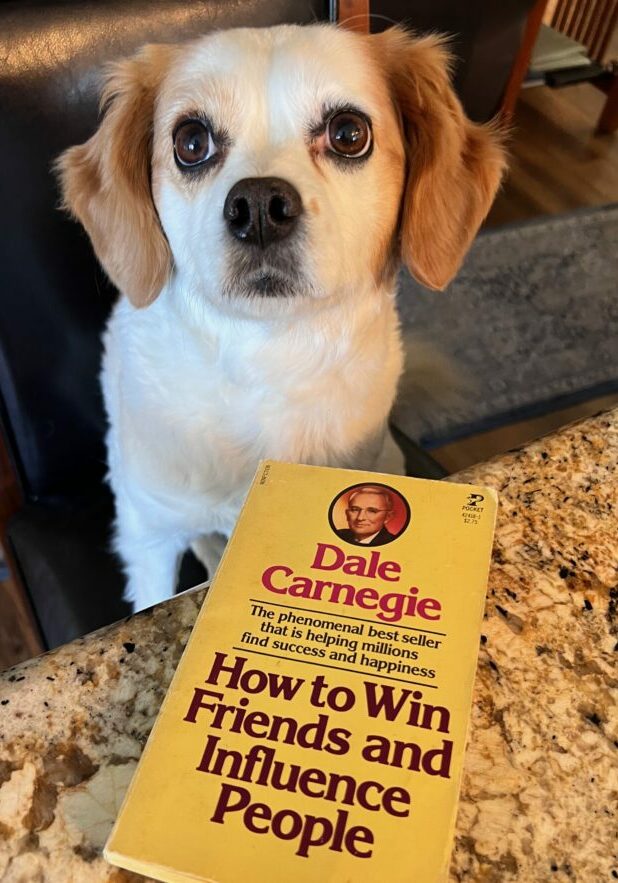How to Win Friends & Influence People by Dale Carnegie
How To Win Friends & Influence People is a total classic in the world of sales and personal development. The reason is that Carnegie has studied this his whole life. From being a teenager with an inferiority complex to overcoming it with encouragement from his mother to be on the debate team.
That’s where he perfected his speaking skills. He started off teaching until the University of Chicago, the American Association for Adult Education, and the United YMCA Schools conducted a survey to find out what adults wanted to study. First, it was “health,” then it was people, specifically “how to understand and get along with people; how to make them like you; and how to in others to your way of thinking.” This book wasn’t written, so Carnegie wrote it, and it’s been a bestseller since 1936.
When I was in college, I changed my major 3 times. First, it was psychology, then pre-med (to make my Dad happy), and then I settled on the one thing that required the least amount of math that I liked to do. (This was a ways off from me ever even knowing about How to Win Friends & Influence People by Dale Carnegie.) So that’s how I settled on Journalism. The focus was Advertising, with a minor in psych. I’m sharing this because one of the core things I repeated to myself over and over again is that “I do not want to ever be in sales.” I just wanted to be in marketing.
Well. I’m sure you can guess what happened… While in my major, I had to go out and sell advertising for the college newspaper. That kind of freaked me out. Cold calling – eek. Well, apparently, it was good training for me cuz, you may have guessed it—my first job out of college was as a sales rep for a book publishing company.
I was not at all polished. So, my manager at the time recommended a bunch of books. And since I was in my company car a lot, driving to locations far and wide, with overnights, I also had books on tape. (Yep, back then, that was before MP3’s.) The term “rolling university” was banted about cuz that’s what my car was.
One of my favorite books and training courses I did was How to Win Friends and Influence People by Dale Carnegie. It was a total classic, first published in 1936. There were so many strategies and tactics that I could simply take to the bank. In fact, rereading today, a lot of his ideas are now standard practices in sales.
Honestly, it’s because of this book and many others, plus my love of books and, later, my love of sales, that I lasted in a sales position for over 8 years. And even after that, I moved into a sales and marketing position as a hired closer. Now, that was fun.
The interesting thing about my journey is that without any real training from Dale Carnegie’s How to Win Friends & Influence People or other sales and communications books, I’m not sure I would have lasted that long in my career.
This book not only helped me be a better salesperson, it also helped me be a better communicator, influencer, and connector. The skills in this book are timeless and highly recommended to help you relate and communicate with anyone.
A Book Summary to Inspire You To Read It!
Quick Summary
This is THE go-to book on how to connect and relate to people. What I love about it is that all the information he wrote in 1936 is still valid and relevant today. Carnegie provides valuable insights into building lasting connections, achieving personal and professional success, as well as how to win people over. There’s so much wisdom about how to become a better communicator, leader and how to be compassionate towards others. It’s a real roadmap to improving and transforming your relationships and interactions with friends, family, and colleagues.
Who Ought to Read this Book and Why:
This book is for everyone who wants to improve their social skills, build meaningful connections and relationships, and is interested in self-improvement, personal development, and building self-confidence. It’s a timeless guide that will also specifically resonate with salespeople, marketers, managers, leaders, teachers, educators, parents, customer service, introverts, or anyone seeking personal growth. It’s the “go-to guide” to be a successful communicator and connector.
Table of Contents:
Preface Donna Dale Carnegie
How This Book Was Written-and Why Dale Carnegie
Nine Suggestions on How to Get the Most Out of This Book
Part 1 Fundamental Techniques in Handling People
1. “If You Want to Gather Honey, Don’t Kick Over the Beehive”
2. The Big Secret of Dealing with People
3. “He Who Can Do This Has the Whole World with Him. He Who Cannot Walks a Lonely Way”
Part 2 Six Ways to Make People Like You
1. Do This and You’ll Be Welcome Anywhere
2. A Simple Way to Make a Good First Impression
3. If You Don’t Do This, You Are Headed for Trouble
4. An Easy Way to Become a Good Conversationalist
5. How to Interest People
6. How to Make People Like You Instantly
Part 3 How to Win People to Your Way of Thinking
1. You Can’t Win an Argument
2. A Sure Way of Making Enemies-and How to Avoid It
3. If You’re Wrong, Admit It
4. A Drop of Honey
5. Get the Other Person Saying “Yes, Yes” Immediately
6. The Safety Valve in Handling Complaints
7. How to Get Cooperation
8. A Formula That Will Work Wonders for You
9. What Everybody Wants
10. An Appeal That Everybody Likes
11. The Movies Do It. Advertisers Do It. Why Don’t You Do It?
12. When Nothing Else Works, Try This
Part 4 Be a Leader: How to Change People Without Giving Offense or Arousing Resentment
1. If You Must Find Fault, This is the Way to Begin
2. How to Criticize-and Not Be Hated for It
3. Talk About Your Own Mistakes First
4. No One Likes to Take Orders
5. Let the Other Person Save Face
6. How to Spur People On to Success
7. Give a Dog a Good Name
8. Make the Fault Seem Easy to Correct
9. Make People Glad to Do What You Want
Appendix: A Shortcut to Distinction Lowell Thomas
Index
Things You Will Discover:
Core Basics of Communication & Connection: (He goes into a lot more detail in the book.)
- Become genuinely interested in others.
- Smile – It helps people feel appreciated and makes them feel seen.
- Remember people’s names.
- Be a good listener.
- Talk in terms of the other person’s interest.
- Make the other person feel important.
- Avoid criticism – Instead, focus on finding common ground and building bridges.
- Give honest and sincere appreciation.
9 Ways to Change People Without Giving Offense or Arousing Resentment:
- Begin with praise and honest appreciation.
- Call attention to people’s mistakes indirectly.
- Talk about your own mistakes first before criticizing others.
- Ask questions instead of giving direct orders.
- Let the other person save face.
- Praise the slightest improvement and praise every improvement.
- Give the other person a fine reputation to live up to.
- Use encouragement. Make the fault seem easy to correct.
- Make the other person happy about doing what you suggest.
Inspiring Book Quotes:
What Are You Thinking?
“It isn’t what you have or who you are or where you are or what you are doing that makes you happy or unhappy. It is what you think about it.”
Making New Friends Easily:
“You can make more friends in two months by becoming interested in other people than you can in two years by trying to get other people interested in you.”
Self-Control Takes Character:
“Any fool can criticize, complain, and condemn—and most fools do. But it takes character and self-control to be understanding and forgiving.”
This Is What You’re Dealing With:
“When dealing with people, remember you are not dealing with creatures of logic, but with creatures bristling with prejudice and motivated by pride and vanity.”
Your Thoughts Are Everything:
“Everybody in the world is seeking happiness—and there is one sure way to find it. That is by controlling your thoughts. Happiness doesn’t depend on outward conditions. It depends on inner conditions.”
Why People Love Dogs:
“Actions speak louder than words, and a smile says, ‘I like you. You make me happy. I am glad to see you.’ That is why dogs make such a hit. They are so glad to see us that they almost jump out of their skins. So, naturally, we are glad to see them.”
No Winners In Arguments:
“You can’t win an argument. You can’t because if you lose it, you lose it; and if you win it, you lose it.”
The Key To A Whole Lot:
“To be interesting, be interested.”
It’s About Understanding:
“Instead of condemning people, let’s try to understand them. Let’s try to figure out why they do what they do. That’s a lot more profitable and intriguing than criticism, and it breeds sympathy, tolerance, and kindness. “To know all is to forgive all.”
This Is Dangerous:
“Criticism is dangerous because it wounds a person’s precious pride, hurts his sense of importance, and arouses resentment.”
Empty Victories:
“If you argue and rankle and contradict, you may achieve a victory sometimes, but it will be an empty victory because you will never get your opponent’s goodwill.”
Look To Serve Others:
“The world is full of people who are grabbing and self-seeking. So the rare individual who unselfishly tries to serve others has an enormous advantage.”
Understanding Others Is Key?
“People who can put themselves in the place of other people, who can understand the workings of their minds, need never worry about what the future has in store for them.”
About the Author – Dale Carnegie
Dale Carnegie (November 24, 1888 – November 1, 1955) was an American writer and lecturer, and the developer of courses in self-improvement, salesmanship, corporate training, public speaking, and interpersonal skills. Born in poverty in Missouri, he initially worked as a salesman and actor before teaching public speaking at the YMCA. His successful classes led to his renowned lectures and publications, including “How To Win Friends and Influence People” (1936), which emphasized the importance of attitude and presented strategies for success. Containing practical advice on how to create success in business and personal lives, this four-part book is a tool used in Dale Carnegie Training. The book had sold five million copies in thirty-one languages by the time of Carnegie’s death. It was a bestseller that remains popular today. He also wrote How to Stop Worrying and Start Living (1948), Lincoln the Unknown (1932), and several other books. One of the core ideas in his books is that it is possible to change other people’s behavior by changing one’s behavior towards them.
Where I Would Recommend Getting Your Copy:
How to Win Friends and Influence People by Dale Carnegie.
Other Books About Writing I’d Recommend:
The Richest Man In Babylon by George S. Clason
How to Talk to Anyone, Anytime, Anywhere by Larry King
Talking the Winner’s Way: 92 Little Tricks for Big Success in Business and Personal Relationships by Leil Lowndes
The Charisma Myth: How Anyone Can Master the Art and Science of Personal Magnetism by Olivia Fox Cabane
It’s Not All About Me: The Top Ten Techniques for Building Quick Rapport with Anyone by Robin Dreeke
Storyworthy: Engage, Teach, Convince, and Transform Your Life with the Power of Storytelling by Matthew Dicks
Surrounded by Idiots: The Four Types of Human Behavior and How to Effectively Communicate with Each In Business (and in Life) by Thomas Erikson
Soulfully Yours,
Previous Book Review

How to Win Friends & Influence People by Dale Carnegie

Hey there, I'm Shannon! Being a voracious reader and passionate about learning, I started this site in the hopes of sharing my thoughts and my love of inspiring nonfiction books that can help you. It's kind of like Buddha meets business. I truly hope you enjoy!
Subscribe to New Posts
© 2023 BooksYouGottaRead.com / SoulfulMarketing.com.
Powered by McCaffery Communications, LLC. All Rights Reserved.

